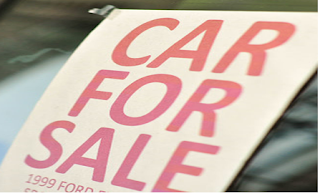Setting Up Budget, Initial Research and Homework
The first thing to be taken care of is your budget. Set up a range and just see how much you can afford to spend. Once this range in set, check all the cars you can buy in this range. Don’t forget to include the registration, insurance, maintenance and the running costs.
Once your budget is set, find out the cars which you can get in that particular range. Compare those cars on the basis of your need, body design, features, engine, comfort, handling, space etc. Try to find out the right car.
The first thing to be taken care of is your budget. Set up a range and just see how much you can afford to spend. Once this range in set, check all the cars you can buy in this range. Don’t forget to include the registration, insurance, maintenance and the running costs.
Once your budget is set, find out the cars which you can get in that particular range. Compare those cars on the basis of your need, body design, features, engine, comfort, handling, space etc. Try to find out the right car.
Vehicle’s History and Condition
Ask for the Registration Certificate of the Vehicle to check it’s Registration Number, Chassis number, Engine number and other legal information of the vehicle. Try to meet the owner at his home so that you can verify the address as well. Demand for the car service records to make sure that the car has not encountered any major collisions before. Moreover, it helps you check whether the car was serviced properly or not. By doing this, you can verify that oil changes were done regularly. The RC book, tax invoice, registration, PUC should be in place.
Small scratches on the outer body can be avoided but dents and bigger marks and scratches are not acceptable. Check the interior starting with the seat covers, steering and all the buttons present inside. Try to check the functionality of all the buttons like the ones used for the headlights and the windshield wipers, A.C and music system. Also check the scaling of the tyres; you can use a 1 Rs coin for that. Don’t buy any modified car. Check the paint job of the car as well and make sure the car is not re-painted.
Pop Up the Hood
Open the hood of the car and test the essential parts like battery, timing belt, and leakage inside any of the parts, the engine oil, ‘racing’ modifications, the coolant and the radiator.
Test Drive
Make sure to Test the car. During the test drive, watch out for engine noises, vibrations, lack of power, or any other drivability issues. When started, the engine should run smooth, without shaking or hesitation. If you feel that the engine is bucking or stumbling when accelerated, there is a problem.
Form 32 & 35:
You will need these documents if the previous owner had taken a loan to purchase the car. Before buying, ask the seller to give you a copy of the no-objection certificate from the finance company, which will clarify that the entire loan has been paid off. If you don't take care of this detail, you could land in a soup
The Final Stage
After checking all the papers and the test drive, if you think that you are convinced with the condition of the car, start negotiating on the price. Don’t pay the same price which is demanded for the car. Try to get a maximum stretch out of it. Make a list of any faults you found with the car, or any work that might need doing, and calculate how much this could add to the price.
Even after going through all these points, if you feel confused and need more advice you talk to the auto experts of finishproblems.com who can help you to get out of all your confusions. Get free experts’ advice from finishproblems.com. Call 18001031000 or visit www.finishproblems.com
Pop Up the Hood
Open the hood of the car and test the essential parts like battery, timing belt, and leakage inside any of the parts, the engine oil, ‘racing’ modifications, the coolant and the radiator.
Test Drive
Make sure to Test the car. During the test drive, watch out for engine noises, vibrations, lack of power, or any other drivability issues. When started, the engine should run smooth, without shaking or hesitation. If you feel that the engine is bucking or stumbling when accelerated, there is a problem.
Form 32 & 35:
You will need these documents if the previous owner had taken a loan to purchase the car. Before buying, ask the seller to give you a copy of the no-objection certificate from the finance company, which will clarify that the entire loan has been paid off. If you don't take care of this detail, you could land in a soup
The Final Stage
After checking all the papers and the test drive, if you think that you are convinced with the condition of the car, start negotiating on the price. Don’t pay the same price which is demanded for the car. Try to get a maximum stretch out of it. Make a list of any faults you found with the car, or any work that might need doing, and calculate how much this could add to the price.
Even after going through all these points, if you feel confused and need more advice you talk to the auto experts of finishproblems.com who can help you to get out of all your confusions. Get free experts’ advice from finishproblems.com. Call 18001031000 or visit www.finishproblems.com


thanx for sharing about "BUYING A USED CAR"
ReplyDelete